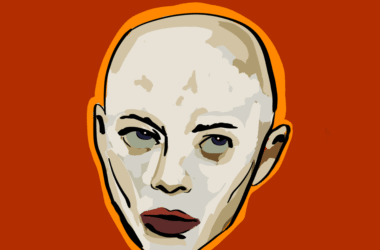possible to pursue creative growth alongside academic demands—yet U3 McGill psychology student Vikki Gilmore is doing just that. The McGill Tribune sat down with the singer-songwriter to talk about her new EP, Someone, and the inspiration behind her work.
With Someone, Gilmore articulates themes common among those her age: Struggles in letting go of the past, navigating love, and the simultaneous fear and elation that come with breaking free from one’s comfort zone.
“I find [that this EP is] like a journal entry from this segment of my life,”Gilmore said.
It’s an apt comparison, considering the EP’s raw vulnerability, as well as Gilmore’s creative process. Much like a diary, Gilmore begins writing the lyrics of a song first. For Someone, she drew inspiration from listening to the stories of people around her and relating them to her own experiences, weaving together a narrative that is both personal and relatable.
“Someone walks into our lives and changes how we see,” Gilmore sings in her title track, elegantly summarizing a universal experience and inviting listeners to resonate with her work.
“I find it’s nice to write about something that people can interpret in a million different ways,” Gilmore said.
Even for Gilmore, her songs are constantly lending themselves to new interpretations.
“Every time I listen to [the EP], or every time I play it, it’ll mean something different to me,” she said.
From a lyrical standpoint, Someone is an insightful exploration of a single chapter in a much larger story. Gilmore sings of love and pain, of loss and longing, and finishes with a farewell to old comforts with “Home.” It is a bittersweet conclusion, that allows for the close of one narrative to make way for the beginning of another.
Gilmore admits that as a self-taught musician, instrumentation does not come as easily as writing lyrics. Listeners can hear that she’s still learning: Someone’s melodies are relatively simple. However, in a world in which popular music is often gimmicky and overproduced, simplicity isn’t necessarily a disadvantage. Gilmore’s stripped-down arrangements lend her work a raw, yet sophisticated quality, drawing attention to the beautiful timbre of her voice and amplifying her emotional honesty.
Gilmore expresses immense gratitude for her producer, fellow Montreal indie musician Mathieu LeGuerrier, and his understanding of her artistic vision.
“I was able to tell him, ‘This is what I have in my head, this is the idea I have, I don’t know how to explain it musically,’ […] and he did it, and it was amazing,” Gilmore said.
A Montreal native, Gilmore cites the city’s unique artistic backdrop as a major influence. She describes an incredibly positive, supportive experience within the local music scene.
“You can do absolutely anything and people will include you,” Gilmore said.
In forging her identity as a musician, Gilmore is inspired by the music of her upbringing as well as the local music sphere.
“I was raised on folk music, so that’s where I kind of lean […] but I find in Montreal we have a beautiful indie scene,” Gilmore said. “I’ve tried taking a lot of inspiration from that, merging the two.”
She urges fellow young musicians to take advantage of the opportunities of such a vibrant scene.
“In Montreal, we have a lot of opportunities to just get out there,” Gilmore said. “People are really willing to support local art. If you reach out and put yourself out there, this is probably the city to do it.”
Gilmore plans on attending graduate school post-McGill, continuing her music while pursuing her interest in psychology.
“I know a lot of people have their professional careers and their music careers on the side,” Gilmore said. “If I can do that at McGill, I can do it in the real world too.”
Gilmore’s two EPs, Where You’re From and her new release Someone, are available now across all music platforms.







